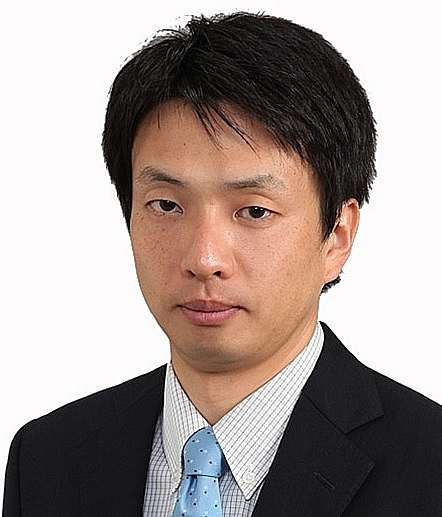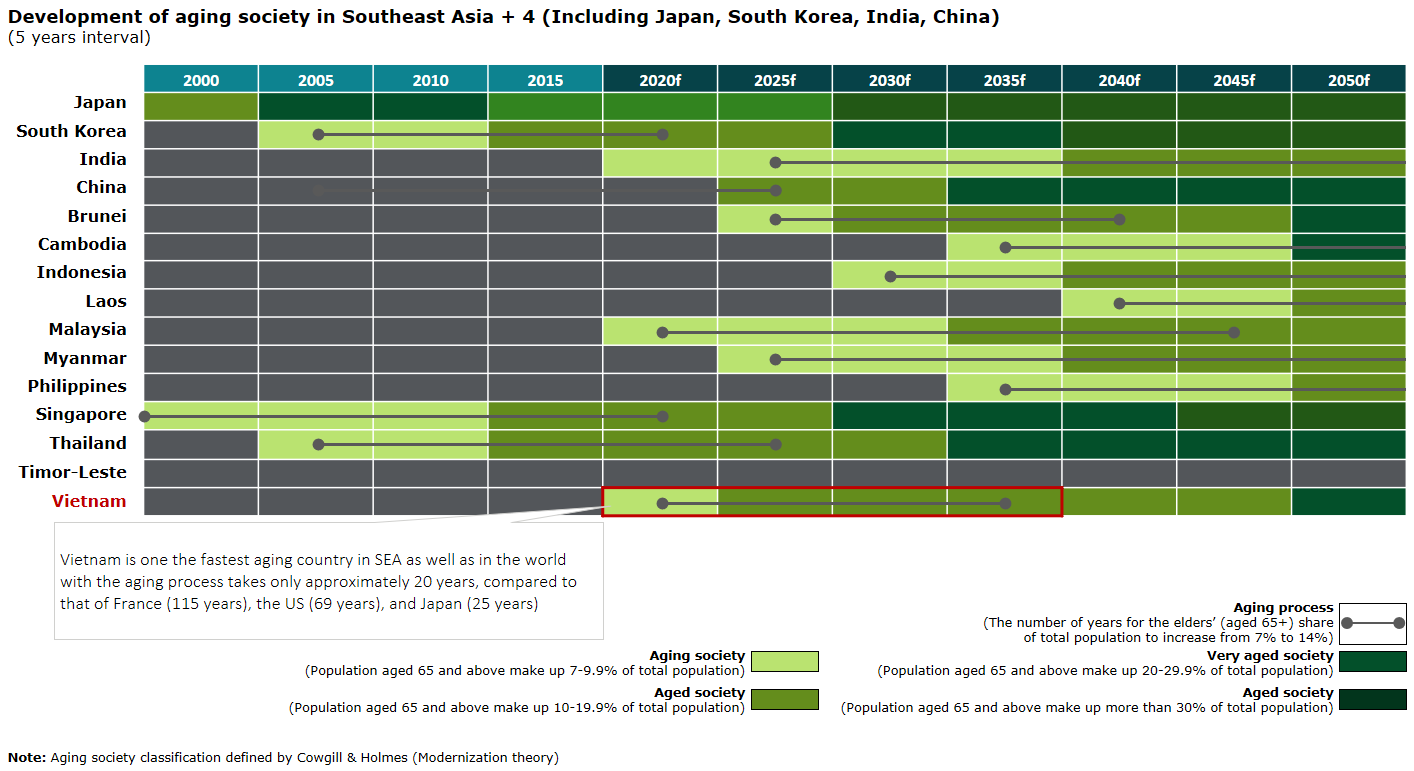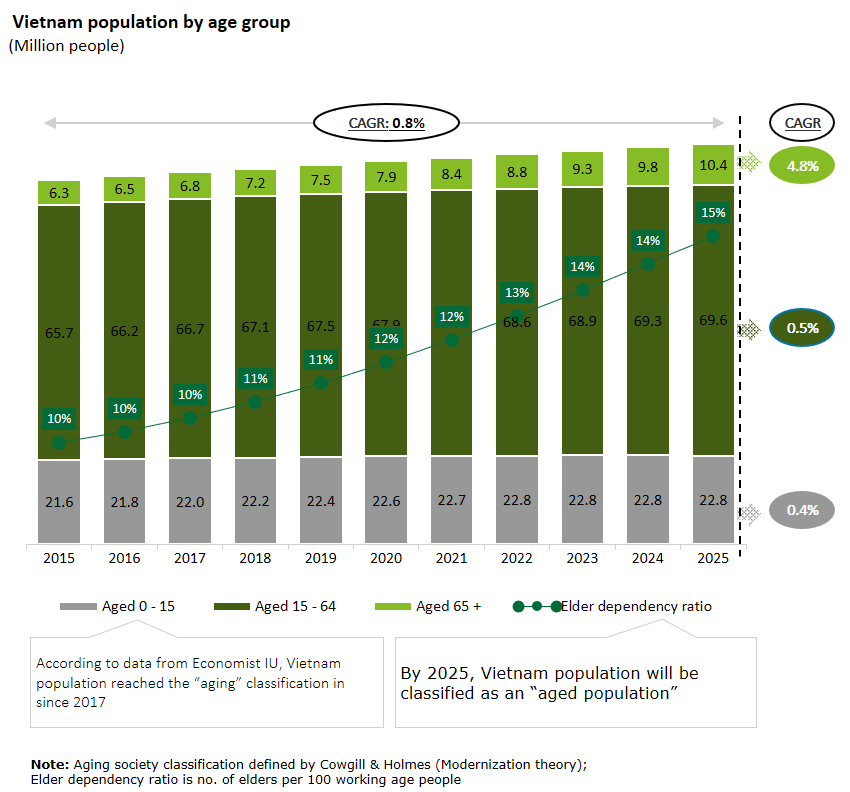How should Vietnam prepare for a future of aged society in 2035?
 |
| Ryo Tsujimoto, partner at Deloitte Asia Pacific |
This issue was presented by Ryo Tsujimoto, partner of Deloitte Asia-Pacific, Japan country leader for International Development and Infrastructure and Capital Project Advisory Services at the International Workshop strengthening Stakeholders Co-operation in Promoting Active Ageing and Mental Health in ASEAN.
The event took place in Hanoi from November 18-19, 2020 and was hosted by the Ministry of Health, with the participation of the ASEAN Secretariat, ASEAN member states, United Nations agencies, international organisations, diplomatic missions in Vietnam, and non-governmental organisations, scholars, and other stakeholders in Vietnam and the region.
Vietnam in its ageing process…
Population ageing is one of the biggest demographic changes in the world recently. In ASEAN, the number of elderly people (65+ years) expects to increase from more than 45 million in 2019 to 75 million by 2030. Many ASEAN member states have begun the ageing process. Vietnam is expected to become the third aged society in ASEAN by 2035, after Singapore (2015) and Thailand (2025 forecast).
According to the Vietnamese General Office of Population and Family Planning (GOPFP), Vietnam currently has more than 10 million elderly people, accounting for 11 per cent of the total population, of which two million people are aged 80+. The percentage of older people in Vietnam is expected to increase to 17 per cent by 2030 and up to 25 per cent by 2050.
 |
| Vietnam soon will become the third aged-society in ASEAN by 2035 forecasted, just after Singapore (2015), Thailand (2025 forecast) (Source: Deloitte analysis based on statistics from United Nation, Economist Intelligence Unit, Vietnam GSO) |
As Vietnam’s population is ageing rapidly, the rationale behind the increase comes from declining fertility rates and rising urbanisation rates. In 2000, there were 2.5 live births per woman, however, the number started decreasing to 1.96 and 1.93 in 2015 and 2025 (forecasted), respectively.
Vietnam has one of the highest urbanisation rates in ASEAN as the urban population rate increased from only 24 per cent of the total population in 2000 to 34 per cent in 2015 and is forecast to reach 41 per cent by 2025. With an increasing ageing rate, reducing fertility rate, and expanding urbanisation, children in Vietnam would not be able to support their parents themselves, thus, demand for elderly care services is expected to rise.
 |
| Source: Deloitte analysis based on statistics from United Nation, Economist Intelligence Unit, Vietnam GSO |
In Vietnam, the income of elderly people comes from various sources but mostly from day-to-day work, pension, savings, and allowance from their children. More than 10 per cent of this is spent on medical expenses. According to the World Bank and GSO, about 16 per cent of household expenses are spent on medical care, and this continues to rise.
Facing rapid ageing concerns, Vietnam should address the issue of infrastructure and environment, personnel market, elderly care services, and other supporting policies.
Lessons from the Japanese elderly care system
In the past, Japanese elderly people also had limited access to elderly care services, which were mainly offered at certain facilities such as elderly homes with limited human resources and expertise. The community perceived elderly people as a social burden, and elderly care-related jobs were limited in the market. Additionally, the government neglected the issue due to the limited budget and rising medical expenditure as the ageing process accelerated.
Nowadays, Japan is known as one of the most “advanced” ageing societies in the world. Japanese elderly services are customised towards users and their family members. The current healthcare system offers the elder healthier and happier lives, as well as helps reduce the burden on their families.
Elderly care focuses on helping the elderly recover from any functional problems they have rather than providing nursing care in elderly homes (the way it was in the previous period). From the perspective of an Asian country that values tradition, family members should take care of the elderly at home in Japan, which opens several kinds of services such as day care, home visit, and short-time stay, in addition to traditional elderly homes or long-time stay type of services. Also, these services are provided by professional care workers who are given proper training and certified as specialists nationwide in Japan.
In terms of human resources, elderly care specialists are nationally qualified professionals in Japan. They are not medical doctors or nurses but qualified and professionally-trained for elderly care while contributing to a mitigated family burden.
Currently, the prospects of Japan's elderly care system care system are brighter than in the past, thanks to the efforts of public and private sectors, and the co-operation between government and private business. The government of Japan promotes and ensures access to such services to the elderly population through national elderly care, or long-term care, insurance system, as well as lowering medical-care expenditure as a whole. The establishment of an elderly-care market has subsequently created a large number of jobs and drives new business development, technology innovation, and infrastructure upgrade fuelled by the private sector.
How can Japanese experiences be applied in Vietnam?
From Japan’s experience, there is room for improvement in the elderly care environment in Vietnam and other ASEAN member states and the private and public sectors could learn from international experience to enhance the elderly care market in the region.
| From Japan’s experience in developing their elderly care market, there is room for improvement in the elderly care environment in Vietnam and other member states. |
First of all, governments need to complete a legal corridor to support the ageing society in the region. As a result, legal documents need to define clearly the rights and responsibilities, departments in charge, and more. Government agencies such as the Ministry of Health (MoH) and the Ministry of Labor, Invalids and Social Affairs (MoLISA) need to harmonically co-operate with each other. The MoH tends to deal with health problems, whereas the MoLISA tends to deal with poor people or welfare.
Secondly, the governments in ASEAN should consider bearing some portion of elderly care expenditure. In other words, social security and tax needs to be allocated proportionately to cover a part of elderly care expenditure. Specifically, countries in Southeast Asia will need to consider national elderly care insurance. Otherwise, elderly people can hardly have access to the necessary elderly care system unless they are rich.
Thirdly, to better serve the elderly and foster a sound elderly care industry, proper regulations for the quality of the service, facility, the number of people, and more should come in place. Many elderly care facilities in Vietnam need significant improvements in the quality of services and professional expertise, especially in supporting functional recovery and close co-operation with the medical services. Government support would be the key to ensure this improvement.
Fourthly, human resources are important in building an advanced elderly care system. Government and the private sector can co-ordinate to design a standardised elderly care professionals training mechanism, then develop elderly care professionals through training and qualification.
Building an environment where the private sector can compete for innovation and better services is critical for better elderly care in the region. The most important factor is, society’s perspective on elderly care should be adjusted in a more positive direction. It is a way to help elderly people recover from any functional problems to live a happy and healthy life with their beloved families and friends.
What the stars mean:
★ Poor ★ ★ Promising ★★★ Good ★★★★ Very good ★★★★★ Exceptional
Related Contents
Latest News
More News
- PM outlines new tasks for healthcare sector (February 25, 2026 | 16:00)
- Ho Chi Minh City launches plan for innovation and digital transformation (February 25, 2026 | 09:00)
- Vietnam sets ambitious dairy growth targets (February 24, 2026 | 18:00)
- Masan Consumer names new deputy CEO to drive foods and beverages growth (February 23, 2026 | 20:52)
- Myriad risks ahead, but ones Vietnam can confront (February 20, 2026 | 15:02)
- Vietnam making the leap into AI and semiconductors (February 20, 2026 | 09:37)
- Funding must be activated for semiconductor success (February 20, 2026 | 09:20)
- Resilience as new benchmark for smarter infrastructure (February 19, 2026 | 20:35)
- A golden time to shine within ASEAN (February 19, 2026 | 20:22)
- Vietnam’s pivotal year for advancing sustainability (February 19, 2026 | 08:44)

 Tag:
Tag:


























 Mobile Version
Mobile Version